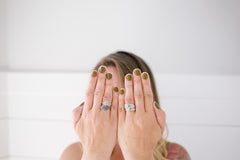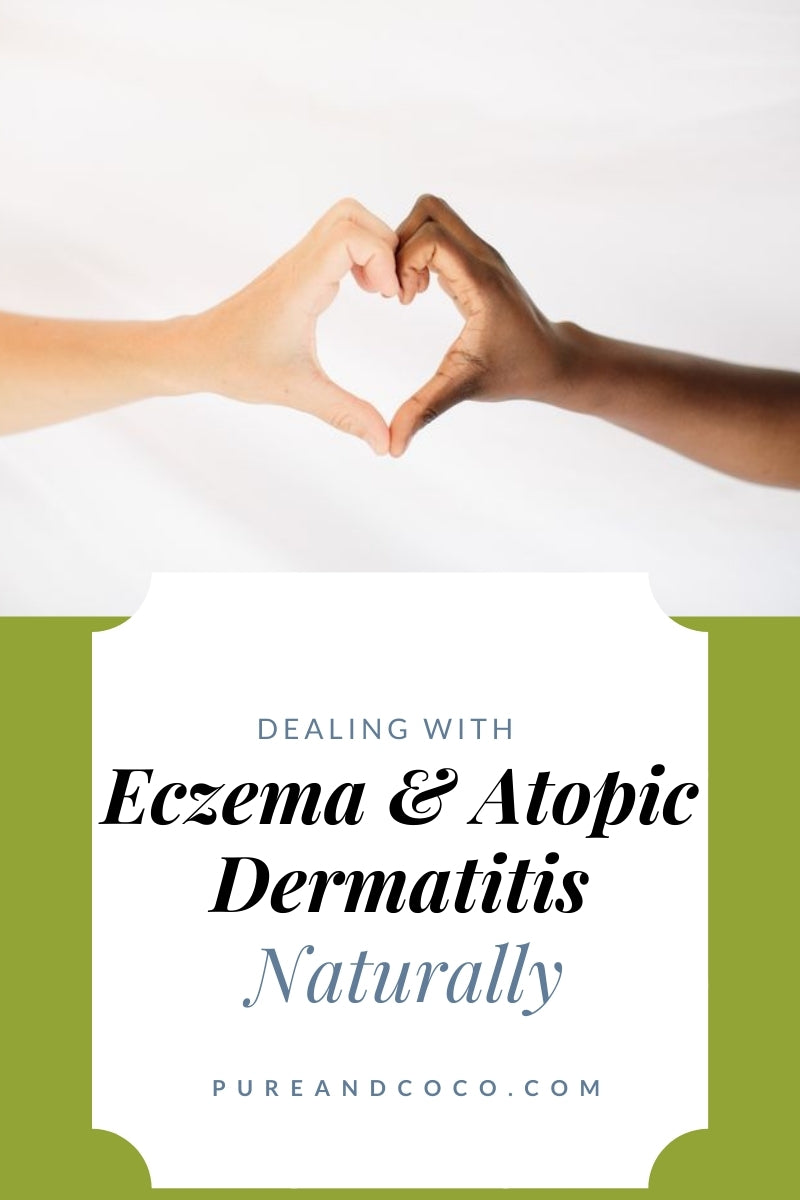Let's start this off with some facts (see below) because reading these articles helped me realize I'm not the only one that has felt this way about my skin, and I think it'll encourage you too.
Below are some facts and tips for dealing with eczema naturally, or Atopic Dermatitis.
According to NationalEczema.org, "31.6 million people (10.1%) in the U.S. have some form of eczema.
One in 10 individuals will develop eczema during their lifetime, with prevalence peaking in early childhood.
People of all skin colors and ethnicities can be affected by eczema:
- White – 11%
- African American/black – 10%
- Asian or Pacific Islander – 13%
- Native American – 13%"

What's interesting about this is knowing that SO many people suffer from this too and you are not alone in this ongoing battle. Because that's what it feels like, a constant battle, and if you dare start taking it easy, or skipping some of your skincare treatments you're likely to experience a flare-up.
Flare-ups can be caused for any number of reasons, from stress, weather, living conditions, diet, and most importantly skincare routines.
Personally, I have dealt with eczema since I can remember, I don't ever remember a winter where my hands didn't become so dry, they would begin to turn red, flake, crack and then bleed. It was embarrassing and I can so vividly remember feeling ashamed--I didn't want anyone to see my hands.
But wasn't just a problem on my hands, the skin on my cheeks was already red (and would flare up at the most awkward times and stay beat red), which is another lovely symptom of eczema as it turns out.

"An estimated 16.5 million U.S. adults (7.3%) have AD that initially began at >2 years of age, with nearly 40% affected by moderate or severe disease.
Atopic dermatitis is not solely a disease of childhood-onset; 1 in 4 adults report adult-onset of initial symptoms.
Atopic dermatitis affects a similar number of male and female children, however, studies have shown it is more common in adult females than males.
In the U.S., AD affects more African-American/black children and European-American children compared to Hispanic children.
Although study percentages vary, adults that are multiracial or white tend to have the highest prevalence of atopic dermatitis.
African-American/black and Hispanic children tend to have more severe AD compared to white children.
80% of individuals affected with AD experience disease onset prior to 6 years of age, and current data suggests at least 80% will “outgrow” their AD by adolescence or adulthood.
Children with more severe, persistent AD have a higher risk for prolonged disease, although AD may persist regardless of severity." according to NationalEczema.org
These facts aren't meant to scare you, but use this as knowledge to keep in your back pocket when you go visit the doctor or your dermatologist.

With that being said, there are alternatives to steroid creams if you're willing to think of trying different products as a science experiment.
Want to start dealing with eczema naturally? First off start, looking at your current skincare products and reading the label on the back, does it list water as the first ingredient, alcohol, or fragrances anywhere else in there too? All three of these ingredients you want to avoid, run away!
Toss them in the trash, or give them away.
If water is the first ingredient in the list, that means the base (the main ingredient is just that) many companies like to use it as a cheap filler in their formulas, and won't moisturize, or nourish your skin like your skin is needing.
Alcohol is drying and can aggravate eczema symptoms and sting like you know what (I have memories of applying random lotions and crying because the sting was so bad).
Fragrances are a no-no too because they can contain a whole slew of ingredients that companies don't have to list what's in it--that's frightening.

Note: If you find your skin doesn't absorb your oils/creams/serums it's because your skin needs the layer of dead skin cells to be removed. One dermatologist (I forget who) explains it like this, "it's like a 50-car pile up on your skin", nothing is going to get past that until you clear the way.
Use a sugar scrub, preferably one with a built-in moisturizer, I use and swear by the Moisturizing Exfoliators for this purpose and it's safe for daily use.
A consistent, daily skincare routine that you use year-round regardless of the weather is essential to transforming your skin and keeping it soft, smooth and happy (no itchy skin here). Consistency will help in the short term and long term and help you keep your sanity and self-confidence.
To help with that gosh-awful itch that never really goes away, and you itch until you're bloody, look for cremes with Mango Butter in them. Preferably the first ingredient listed, like the 6-in-1 Face & Body Cremes do.
Mango Butter is touted for helping eczema itch fast and keeping skin calm for hours after just one application--again consistency is key to keeping these symptoms under control.



